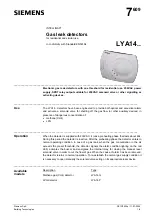
GAS 222.35 AMEX
WARNING
High voltage
Damage to the device in case of insulation testing
Do not proceed insulation tests with high voltage to the
device as a whole!
Electric strength test
The necessary tests of all assemblies required to be tested
were carried out at the factory (test voltage 1 kV or 1.5 kV de-
pending on component).
To check the electric strength again yourself, only do so on the
respective individual components.
• Now perform the electric strength test against earth.
4.7.1 Heated pressure vessel (optional)
A heated blowback vessel may optionally be used for blow-
back. Heated via self-regulating PTC heating cartridge to pro-
tect against frost.
The electrical (mains connection 115/230 V AC) connects via
the junction box per the enclosed terminal diagram at the
end.
• Only use cables with a temperature resistance of > 100 °C
to connect to power.
• Make sure the connecting cable has sufficient strain relief
(match cable diameter to the seal on the junction box).
• When connecting, also observe the applicable Ex protec-
tion regulations and general warnings in these operating
instructions.
CAUTION
Equipment damage
Cables damaged
Do not damage the cable during installation. Install a strain
relief for the cable connection. Secure the cable against twist-
ing and loosening. Please note the temperature resistance of
the cables (> 100 °C/212 °F).
DANGER
Adiabatic compression during gas blowback (explosion
hazard)!
Adiabatic compression may cause high gas temperatures and
must be checked by the user.
Gas blowback may result in high gas temperatures due to
adiabatic compression. This can cause flammable gases to ig-
nite spontaneously.
a) Blowback of explosive atmosphere / gases is prohibited.
b) Flammable atmosphere / gases (non-explosive) may only
be blown back with nitrogen (inert gas).
5 Operation and Control
NOTICE
The device must not be operated beyond its specifications.
NOTICE
The weather hood must be closed during operation!
WARNING
Housing or component damage
Never exceed the maximum working pressure and temperat-
ure range of the drive.
DANGER
Explosion hazard due to electrostatic discharge
Equipment may only be used where normal operating condi-
tions do not produce frequent flammable, electrostatic dis-
charge.
5.1 Before Start-Up
Before starting the device, verify:
• The hose and electrical connections and the heating tape
are not damaged and installed correctly.
• No parts of the sample gas probe have been removed.
• The protection and monitoring devices are installed and
functional (e.g. flame arrester).
• The gas inlet and outlet on the gas probe are open.
• Ambient parameters are met.
• Probe parts are resistant to media to be conveyed and in
the surrounding area.
• The performance specifications in the type plate are met.
• The voltage and frequency of the heating tape match the
mains values.
• The temperature has an energy-limited connection (U
max
= 30V, I
max
= 100 mA).
• The electrical connections are tight.
• The monitoring equipment is connected and set as spe-
cified.
• All connection cables are installed without strain.
• Precautions have been taken; earthing.
• The junction box cover is closed and the cable gland is
properly sealed.
6 Maintenance
Always observe the applicable safety- and operating regula-
tions when performing any type of maintenance. Please refer
to the original operator’s manual on the included CD or online
at www.buehler-technologies.com for maintenance informa-
tion.
7 Service and Repair
Please refer to the original operator’s manual on the included
CD or online at www.buehler-technologies.com for a detailed
description of the unit including information on
troubleshooting and repair.
12
Bühler Technologies GmbH
BX460058 ◦ 01/2020













































